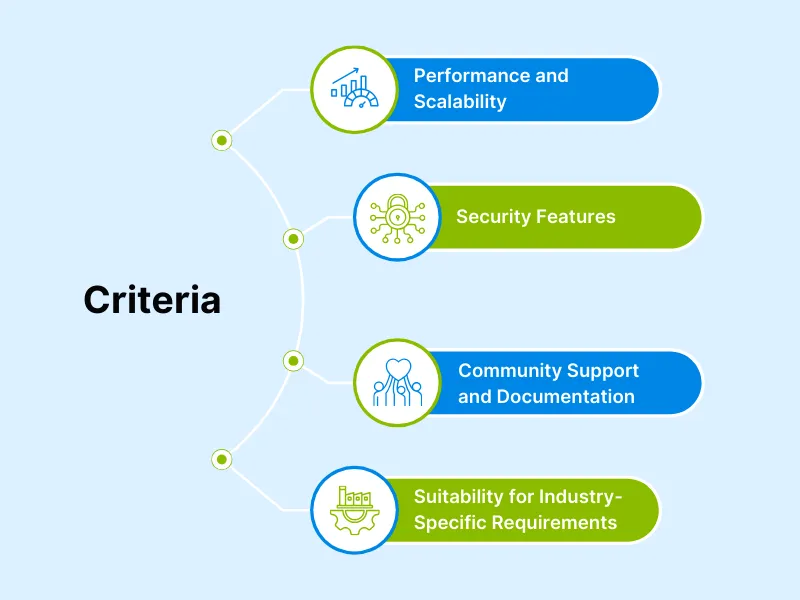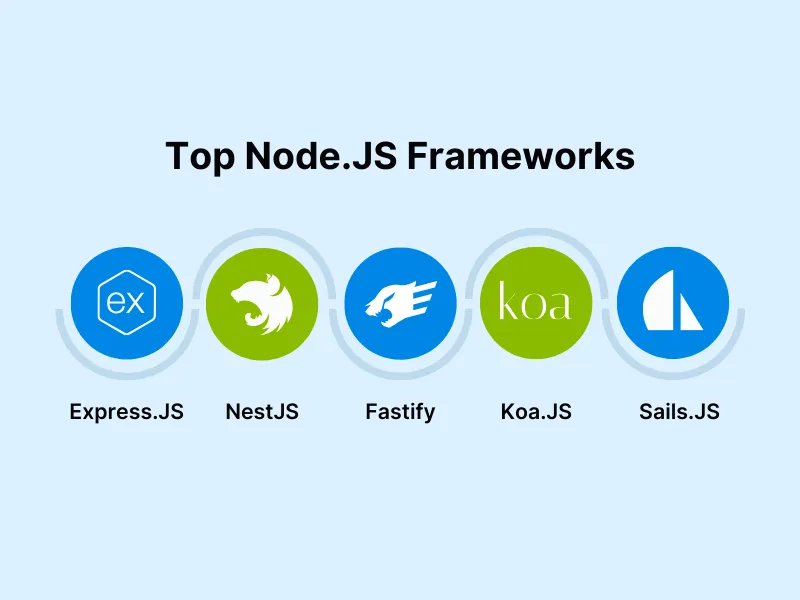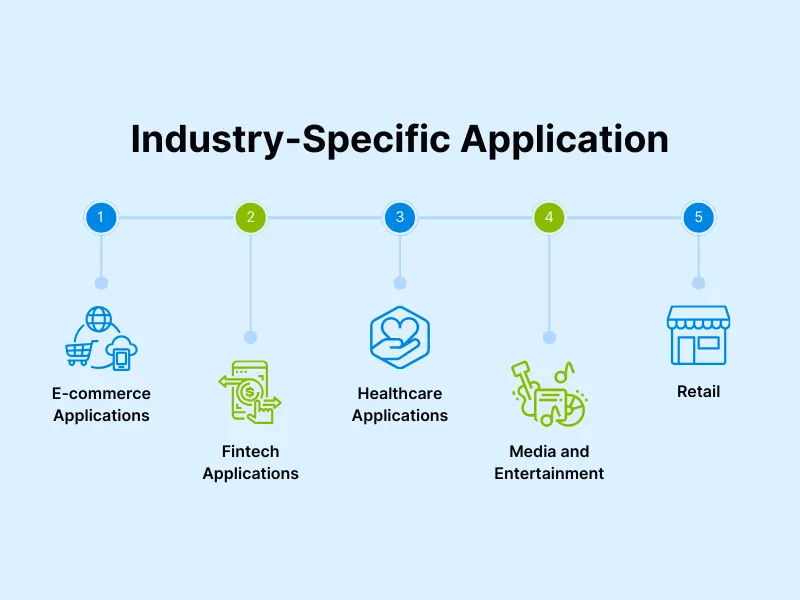Top Node.JS Frameworks in 2024 and Their Best Uses Across Different Industries
In this blog, we’ll explore the top Node JS frameworks of 2024 and their best uses across various industries. By the end, you'll have a clearer understanding of which frameworks align with your project needs, helping you make an informed decision.

Introduction
"Adapt or perish, now as ever, is nature's inexorable imperative."
This famous quote by H.G. Wells resonates deeply in the world of modern web development.
Modern web development has transformed how we build and interact with web applications, enabling businesses to create robust, scalable, and user-friendly digital experiences. These advancements drive user engagement and business growth by ensuring seamless functionality across various devices and platforms.
Central to this technological shift is Node.JS, a versatile and event-driven JavaScript runtime that has revolutionized server-side development.
NodeJS Framework's significance extends beyond its technical capabilities. Its vast ecosystem of libraries and frameworks provides pre-built modules and tools that accelerate development.
Selecting the right Node.JS frameworks is crucial, as it can significantly impact your application's performance, scalability, and maintainability. This decision is particularly critical for industry-specific needs, where different sectors may demand unique features and capabilities.
What Is Node.JS And Why Use Node.JS?
To grasp the significance of Node.JS, let's start with a clear definition.
Node.JS is a versatile, event-driven JavaScript runtime designed for building scalable network applications. It allows developers to utilize JavaScript for both client-side and server-side scripting, streamlining development and enhancing efficiency.
Key benefits include:
- Node.JS is renowned for its HIGH PERFORMANCE, due to its non-blocking, asynchronous architecture. This allows it to handle multiple requests simultaneously without blocking the execution thread.
- Node.JS supports seamless HORIZONTAL SCALING, enabling applications to handle increasing loads by adding more Nodes to the existing system effortlessly.
- Node.JS excels in REAL-TIME APPLICATIONS such as chat applications and streaming services, where responsiveness and low latency are critical.
Node.JS boasts a robust ecosystem with a variety of frameworks tailored to different development needs. Frameworks like Express.JS, Nest.JS, and Koa.JS provide developers with powerful tools and libraries to expedite development, enhance functionality, and maintain code quality.
These frameworks empower developers to build scalable APIs, web applications, and microservices efficiently.
Criteria For Selecting A Node.JS Framework:

Choosing the right NodeJS web framework is critical to the success and scalability of web development projects. Understanding each framework and its criteria is important so that developers can choose the framework that best meets their design goals and technical requirements.
We explore how these factors contribute to building sustainable and effective applications in today's dynamic digital environment.
Performance and Scalability:
Node.JS' blocking architecture inherently supports high performance, allowing applications to efficiently handle concurrent requests. Factors such as request processing capabilities, response times under load and support for caching mechanisms are crucial for evaluating performance.
Node JS Framework implements best practices such as asynchronous I/O operations and efficient memory management to ensure excellent performance.
Scalability, on the other hand, is facilitated by NodeJS API framework ability to scale applications horizontally by adding Nodes. By supporting clustering and load-balancing mechanisms, the framework enables seamless scalability as application traffic grows.
Security Features:
With the trend toward using web-based applications for... well, basically everything, more attention is being drawn to "cyber security," which gave rise to a precaution termed “Data Security”.
Node.JS frameworks should provide strong security features that protect against common vulnerabilities such as cross-site scripting (XSS), SQL injection, and cross-site request forgery (CSRF). Frameworks like Nest.JS emphasize secure coding practices and provide built-in modules for authentication, data validation, and encryption.
The main security features to look at are:
- Flow Sanitization Middleware: Prevents malicious flow from entering application logic.
- Authentication and Authorization: Supports authentication methods such as JWT (JSON Web Tokens) and OAuth for secure user access control.
- Secure Session Management: Ensures session data integrity and protection against session hijacking.
- Secure API development: Enables HTTPS, rate limiting, and API token authentication for secure API endpoints.
Community Support and Documentation:
A strong community ensures that support and comprehensive documentation are essential for developers adopting Node.JS frameworks.
Established frameworks like Express.JS and Koa.JS benefit from large developer communities that contribute to plugins, extensions, and debugging solutions.
A strong community ensures timely updates, bug fixes, and ongoing support through forums, GitHub repositories, and community-driven tutorials. In addition, well-curated documentation provides clear instructions, API references, and use cases that accelerate deployment and efficient development.
Suitability for Industry-Specific Requirements:
Different industries have unique requirements that influence the choice of Node JS Framework.
Example:
- Industries such as gaming, messaging platforms and streaming services require frameworks with WebSocket support and powerful event-handling capabilities. Frameworks like Socket.io are great for building real-time applications.
- E-commerce and the financial industry prioritize security, scalability and transaction integrity. Frameworks with strong security features, transaction support and integrations with payment gateways are ideal choices.
- Healthcare and IoT require frameworks that ensure data protection, compliance with regulations such as the Health Insurance Portability and Accountability Act (HIPAA), and support for communication protocols for IoT devices.
Choosing a Node.JS framework that meets your specific industry needs would ensure optimized performance, enhanced security, and scalability tailored to your application's requirements.
Top Node.JS Frameworks For 2024

2024 brings forth a new wave of Node.JS frameworks, each tailored to meet the dynamic demands of modern web development.
Here, we present the top five frameworks of the year, highlighting their key features and optimal applications across diverse industries.
Express.JS:
Express.JS is a minimalist web application framework for Node.JS, known for its simplicity, flexibility, and robust features. It provides a robust set of features for web and mobile applications, APIs, and microservices, making it one of the most popular choices among Node.JS frameworks.
Node.JS with Express is highly versatile, making it suitable for a variety of industries.
Key Features of Express.JS:
Feature | Description |
Middleware Support | Express.JS offers a robust middleware system, allowing developers to manage requests, responses, and application flow efficiently. |
Routing | It provides a powerful routing mechanism to define application endpoints and handle HTTP methods (GET, POST, PUT, DELETE, etc.). |
Template Engines | Supports various template engines like EJS and Pug (formerly Jade) for dynamic content generation on the server side. |
Error Handling | Built-in error handling middleware to manage runtime errors and exceptions gracefully. |
Static File Serving | Simplifies serving static files (HTML, CSS, images) through built-in middleware. |
Best Use Cases of Express.JS Across Different Industries:
- Express.JS is ideal for building scalable e-commerce platforms due to its robust routing capabilities and middleware support. A global example is eBay, which uses Express.JS to handle high traffic and ensure smooth user experiences.
- Used to develop secure healthcare applications, Express.JS facilitates compliance with regulations like HIPAA. For instance, Zocdoc uses Express.JS to manage appointments securely and ensure patient data confidentiality.
- Express.JS is suitable for real-time applications such as chat platforms. WhatsApp, a global messaging service, utilizes Express.JS for its backend infrastructure to handle millions of messages in real-time.
- Express.JS is widely adopted for building robust APIs. It's used by Twitter to power its API, handling vast amounts of data and ensuring high availability and performance.
- Node.JS with Express is particularly effective in e-commerce and media/entertainment, where it excels at handling high traffic volumes and efficiently managing real-time inventory updates.
By leveraging Express.JS, businesses can streamline software development, enhance API services, and deliver secure, scalable solutions tailored to industry-specific needs.
NestJS:
NestJS is a progressive Node.JS framework for building efficient, reliable, and scalable server-side applications. It leverages TypeScript to enhance developer productivity and maintainability by providing a structured architecture inspired by Angular.
This framework is particularly suited for building robust APIs, microservices, and enterprise-grade applications.
Key Features of NestJS:
Feature | Description |
Modular Architecture | Built on top of well-established modules and libraries, facilitating code reuse and scalability. |
Dependency Injection | Supports dependency injection to manage components and their dependencies effectively. |
TypeScript Support | Offers strong typing and ECMAScript features, enhancing code quality and developer experience. |
Decorators & Pipes | Uses decorators for route handling and pipes for data transformation and validation. |
GraphQL Integration | Seamless integration with GraphQL for building efficient APIs with strongly typed schemas. |
Best Use Cases of NestJS Across Different Industries:
NestJS finds application across various industries due to its robust architecture and scalable capabilities:
- NestJS is suitable for building scalable backend systems for handling high traffic and complex business logic like e-commerce.
- Developing secure APIs for healthcare data management and telemedicine applications. Example: Implementing JWT for secure authentication in healthcare apps.
- NestJS is ideal for global real-time applications such as live sports score updates or financial market data streaming, leveraging its scalable and efficient architecture.
NestJS is preferred by NodeJS Development Companies for API development services due to its structured approach and TypeScript support, making it a top choice for building secure and scalable applications.
Fastify:
Fastify is a fast and low-overhead Node.JS web framework that provides robust and efficient APIs. It's designed to handle high loads with minimum overhead and boasts impressive speed benchmarks, making it ideal for performance-focused applications.
Key Features of Fastify:
Feature | Description |
Speed and Efficiency | Fastify is built for speed, boasting low overhead and high performance. |
Schema-based Validation | Provides powerful schema-based validation for routes and request payloads. |
Extensible Plugin System | Offers an extensible plugin architecture to enhance functionality easily. |
Logging and Error Handling | Built-in support for logging and structured error-handling mechanisms. |
HTTP2 and WebSocket Support | Native support for HTTP2 and WebSocket protocols for real-time applications. |
Best Use Cases of Fastify Across Different Industries:
- Fastify's speed and efficiency are beneficial for handling high volumes of transactions and real-time inventory updates that can be useful for a global e-commerce platform.
- Building secure healthcare apps with Fastify includes JWT-based authentication for patient records and seamless API integration with healthcare systems.
- Fastify's WebSocket support enables real-time analytics platforms to deliver instant global insights and visualizations, enhancing decision-making in finance, marketing, and other industries.
Koa.JS:
Koa.JS is a minimalist Node.JS web framework that provides a robust foundation for building web applications and APIs. Developed by the creators of Express.JS, Koa.JS emphasizes middleware composition, allowing developers to leverage modern JavaScript features such as async/await for more readable and efficient code.
It is known for its lightweight nature and modular design, making it highly flexible for developers seeking customizable solutions.
Key Features of Koa.JS:
Feature | Description |
Middleware Flow Control | Koa.JS utilizes middleware functions in a more streamlined manner compared to traditional frameworks, enhancing control over request-response flows. |
Async/Await Support | Built with native support for async functions, Koa.JS simplifies asynchronous code handling, improving readability and maintainability. |
Modular and Lightweight | Its modular structure allows developers to add only necessary features, keeping applications lightweight and efficient. |
Contextual Error Handling | Koa.JS provides robust error-handling capabilities, making it easier to manage and debug errors within applications. |
HTTP Utility Methods | Offers a set of utility methods for streamlined HTTP request and response handling, enhancing developer productivity. |
Best Use Cases of Koa.JS Across Different Industries:
- Koa.JS is perfect for creating scalable APIs and securely managing high-volume transactions. An example would be when global online shopping websites utilize Koa.JS to smoothly handle extensive customer engagements.
- Koa.JS is utilized in sectors such as gaming and live streaming to facilitate real-time data handling and support for WebSockets, guaranteeing interactive user interactions on a worldwide scale.
- Utilizing Koa.JS guarantees the safe transfer of confidential patient information, enabling the creation of HIPAA-compliant healthcare applications such as secure healthcare apps implemented with JWT authentication.
- Koa.JS streamlines the development of RESTful APIs and microservices, making it a top choice for companies seeking API development services and looking to hire NodeJS Developers for API-first approaches.
Sails.JS:
Sails.JS is a robust MVC (Model-View-Controller) framework for building data-driven applications on Node.JS. It simplifies the development process by providing a convention-over-configuration approach, allowing developers to focus on application logic rather than boilerplate code.
Sails.JS integrates seamlessly with front-end frameworks like Angular, React, and Vue.JS, making it versatile for building full-stack applications.
Key Features of Sails.JS:
Feature | Description |
MVC Architecture | Sails.JS follows a Model-View-Controller pattern, facilitating organized and scalable code. |
Real-time Capabilities | Built-in support for WebSockets enables real-time data synchronization across clients. |
RESTful API Generation | Automatic generation of REST APIs from Sails.JS models simplifies backend development. |
Data Validations | Provides robust validation mechanisms for ensuring data integrity and security. |
Auto-Generated APIs | Easily generates CRUD APIs for database models, reducing manual coding efforts. |
Best Use Cases of Sails.JS Across Different Industries:
- Sails.JS is instrumental in e-commerce for powering real-time inventory management systems. It ensures that stock levels are continuously updated across platforms, allowing businesses to efficiently manage their inventory and prevent stockouts.
- Building secure healthcare apps with real-time patient monitoring and data analytics capabilities, ensuring compliance with regulations like HIPAA.
- Globally, Sails.JS is pivotal in developing applications that require real-time updates. For example in live sports scoreboards or financial trading platforms.
Looking For Reliable Node.JS Solutions?
Trust TRooTech To Transform Your Ideas Into Reality
Industry-specific Applications

E-commerce Applications
Recommended Frameworks
- Express.JS
- Next.Js
Key Features and Benefits of using NodeJS framework for E-commerce
Feature | Description |
Server-side Rendering (Next.JS) | Enables faster page load times and SEO benefits, crucial for dynamic content in e-commerce. |
Middleware Support (Express.JS) | Facilitates modular routing and request handling, enhancing flexibility in e-commerce workflows. |
Real-time Data Updates | Supports instant inventory updates and order processing, crucial for maintaining accurate stock levels. |
Scalability | Allows handling high traffic volumes during peak times like sales events, ensuring robust performance. |
SEO Optimization (Next.JS) | Provides enhanced SEO capabilities through optimized rendering and structured data support. |
Benefits:
- Improved SEO performance with Next.JS's server-side rendering.
- Enhanced flexibility and modularity in backend development with Express.JS middleware.
- Real-time updates for inventory management and order processing.
- Scalability to manage high traffic during sales and promotional events.
Fintech Applications
Recommended Frameworks
- NestJS
- Fastify
Key Features and Benefits of using NodeJS framework for Fintech Applications
Feature | Description |
Security | Ensures robust security measures such as encryption, HTTPS support, and API authentication. |
Scalability | Supports scalable architecture to handle large volumes of transactions and user data. |
Performance | Optimizes performance with fast routing and low overhead, crucial for real-time financial data processing. |
Compliance | Facilitates compliance with financial regulations (e.g., GDPR, PCI-DSS, SEC regulations). |
Microservices Support | Enables modular development with microservices, enhancing flexibility and maintainability. |
Benefits:
- Implements encryption and secure protocols for data integrity and cyber threat protection.
- Supports growth in user base and transactions without performance loss.
- Reduces API response times and latency for real-time transactions and analysis.
- Ensures fintech firms meet data privacy and security standards.
- Facilitates agile development and scalable, fault-tolerant deployments.
Healthcare Applications
Recommended Frameworks
- Koa.JS
- Hapi.JS
Key Features and Benefits of using NodeJS framework for Healthcare Applications
Feature | Description |
Lightweight | Minimalist framework with modular design for building efficient healthcare applications. |
Middleware Functions | Allows easy integration of middleware functions for handling requests and responses. |
Async/Await Support | Utilizes async functions and generators, enhancing readability and error handling in code. |
Input Validation | Built-in validation mechanisms for ensuring data integrity and security compliance (e.g., HIPAA). |
Scalable Architecture | Supports scalable application development, ensuring performance under increasing user loads. |
Secure Authentication | Supports secure authentication methods like JWT (JSON Web Tokens) for patient data confidentiality. |
Real-Time Updates | Facilitates real-time monitoring and notifications for healthcare professionals and patients. |
Benefits:
- Robust security features ensure sensitive patient data is protected.
- Scalable architecture supports growing healthcare service demands.
- Helps in adhering to healthcare regulations such as HIPAA.
- Enables real-time data updates critical for patient care and monitoring.
Media and Entertainment
Recommended Frameworks
- Sails.JS
- Express.JS
Key Features and Benefits of using NodeJS framework in the Media and Entertainment industry
Feature | Description |
| Real-Time Data Streaming | Supports real-time streaming of data, essential for live video, audio, and content delivery apps. |
| Scalable Architecture | Built-in scalability features accommodate varying loads and user traffic spikes efficiently. |
| SEO-Friendly Architecture | Frameworks like Next.JS offer server-side rendering capabilities, enhancing SEO for content-heavy sites. |
| Content Delivery Networks (CDNs) | Integration with CDNs ensures fast content delivery across global audiences. |
| Middleware Support | Middleware functions streamline request handling and enhance application performance. |
Benefits:
- Enables live streaming and updates for interactive media experiences.
- Handles high volumes of concurrent users during live events or popular content releases.
- Improves search engine visibility through server-side rendering and optimized page load speeds.
- Ensures fast and reliable content delivery globally, enhancing user experience.
Retail
Recommended Frameworks
- Next.JS
- Fastify
Key Features and Benefits of using NodeJS framework For Retail
Feature | Description |
SEO-Friendly Architecture | Next.JS offers server-side rendering, enhancing SEO and improving search engine visibility. |
Server Performance | Fastify provides high-speed server performance, reducing latency for faster page loads. |
Scalable Architecture | Node.JS frameworks support scalability, accommodating seasonal spikes in online traffic. |
API Integration | Enables seamless integration with third-party APIs for payment gateways, inventory systems, etc. |
E-commerce Capabilities | Facilitates building robust e-commerce platforms with secure transaction processing capabilities. |
Benefits:
- Enhances search engine rankings through efficient server-side rendering.
- Ensures fast and responsive user experiences, crucial for reducing bounce rates.
- Scales effortlessly to handle increased traffic during peak shopping seasons.
- Integrates seamlessly with various APIs to enhance functionality and customer experience.
Not sure where to start with Node.JS development?
Get Matched With Our Industry-leading Experts Today.
Case Studies
Walmart Using Node.JS for Scalability and Performance
Walmart, a major global retail corporation, had difficulties handling large numbers of customers and updating inventory instantly, especially during busy shopping times. The company required a strong solution to improve the performance and scalability of its online platform.
Obstacles Encountered:
Walmart's website sees substantial increases in traffic during sales events such as Black Friday and Cyber Monday. The requirement for instant updates to guarantee precise inventory control and customer contentment.
The current system had difficulty expanding effectively as demand grew.
Implemented solutions:
Walmart decided to use Node.JS to reconstruct its server-side application, taking advantage of its event-driven I/O model that is non-blocking.
This method enabled Walmart to effectively manage multiple simultaneous connections and guarantee real-time data processing.
- The use of Node.JS decreased page loading times by more than 50%, leading to a more seamless and speedy user interface.
- Walmart effectively handled peak traffic during big sales events without any disruptions in service or a decrease in performance.
- Increased responsiveness and live inventory updates substantially boosted customer satisfaction and involvement.
Walmart's online platform managed millions of transactions smoothly during the 2023 Black Friday sale, due to the effective architecture offered by Node.JS. The live inventory updates made sure customers had dependable product availability information, leading to lower cart abandonment rates and higher sales.
PayPal Enhancing Performance with Node.JS
PayPal, a prominent player in online payment services worldwide, aimed to simplify its application development process and enhance the efficiency of its web applications. The company required a single platform to improve teamwork between frontend and backend teams.
Obstacles Encountered:
The necessity of having a uniform development environment for both frontend and backend teams was the biggest obstacle. Current applications encountered performance problems, which affected both user experience and transaction efficiency.
Dealing with an increasing amount of transactions and user engagements necessitated a solution that could scale efficiently.
Implemented Solution:
PayPal switched to Node.JS for its web app development, enabling developers to utilize JavaScript for both front-end and back-end coding. This cohesive method simplified the development process and enhanced application performance.
After switching Node.JS improved the user experience by cutting the average page response time. The new system processed twice as many requests per second as the previous Java-based setup.
Enhanced performance and dependability of the application resulted in heightened user contentment and improved transaction effectiveness.
During the 2023 holiday season, PayPal experienced the highest number of transactions ever processed efficiently. Users were able to finish their transactions quickly, even during times of high usage, due to the decrease in response times.
The efficient development process enabled PayPal to roll out updates and new features quickly, keeping them ahead in the market.
Struggling With Your Node.JS Project?
Our Experts Can Help You Find The Perfect Solution.
Conclusion
"That's it!" Picking the right Node.JS framework is key to your project's success, regardless of industry.
Here's our final advice:
- E-commerce: Go with Express.JS or Next.JS to handle high traffic and boost SEO.
- Fintech: NestJS or Fastify are great for secure and efficient transactions.
- Healthcare: Koa.JS or Hapi.JS are perfect for managing secure patient data.
- Media and Entertainment: Sails.JS and Express.JS shine in real-time data streaming and user engagement.
- Retail: Next.JS and Fastify will improve server performance and user experience.
For tailored advice, consulting with experts is the way to go. Reach out for a consultation on Node.js development with TRooTech, the leading NodeJS Development Company. We offer comprehensive solutions tailored to your needs, whether it's expert consultation, project enhancements, or a full-scale project from scratch. Our team excels in delivering top-notch API development services and cutting-edge software development.
Specializing in secure healthcare apps with JWT, we have the expertise to ensure your project's success. Discover the essential things to look for when you hire NodeJS developers and learn how to hire Node.js developers from the best in the industry.
Choose TRooTech for unparalleled quality and reliability. Your project deserves the best—trust TRooTech to deliver excellence every time.
FAQs
Node.js is a JavaScript runtime built on Chrome's V8 engine, allowing developers to build scalable network applications. It's popular because it uses an event-driven, non-blocking I/O model, making it efficient and perfect for real-time applications. Its large ecosystem of packages and active community also contribute to its popularity.
Some of the best frameworks for Node.js include Express.js, Koa.js, Nest.js, Hapi.js, and Sails.js. These frameworks offer different features, such as simplified server-side coding, modularity, and scalability, catering to various project needs.
Node.js handles asynchronous operations using an event-driven, non-blocking I/O model. This means it can process multiple requests simultaneously without waiting for previous operations to complete. This approach enhances performance and efficiency, especially in applications requiring real-time interactions.
Yes, Node.js is highly effective for building APIs. Its asynchronous nature and the availability of frameworks like Express.js make it ideal for creating robust, scalable APIs that can handle numerous requests efficiently.
TRooTech stands out as the best choice for Node.js development due to our extensive experience and expertise in delivering tailored solutions across various industries. We provide comprehensive services, including expert consultation, project enhancements, and full-scale development from scratch. Our focus on secure development practices and cutting-edge technologies ensures the success of your project.
Security best practices in Node.js include using secure coding techniques, validating user input, managing dependencies carefully, implementing proper error handling, and using security tools like Helmet.js to protect against common vulnerabilities. Regular updates and patches are also crucial for maintaining security.

